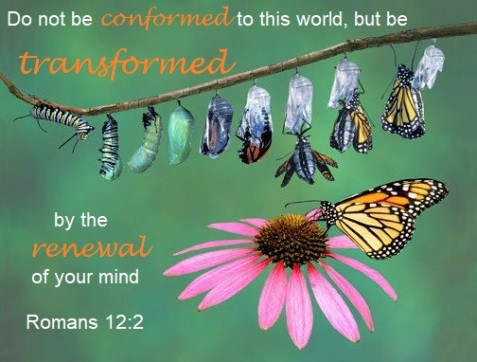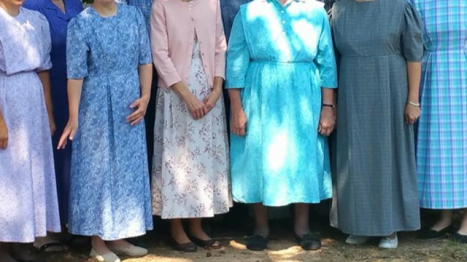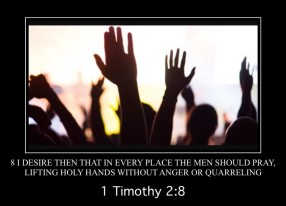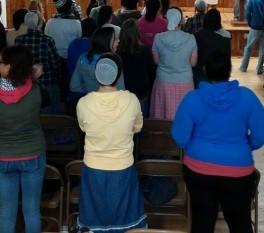Years ago, a non-Mennonite pastor friend shared some concerns he had about his church’s youth group. He said he rarely let his children go to any of their youth events because the youth group and the youth leaders had such a “worldly mindset”.
His words caught me by surprise. He and his family were not “plain” and I wondered what a non-Mennonite considered worldly. I was even a bit surprised that he was worried about how worldliness might affect his children. By the standards that I had been raised in, his entire family was very “worldly”.
 However, I have since learned that no Christian—regardless of denomination—wants to be considered worldly or to have a worldly mindset. So, what is worldliness? What does it look like? What does the Bible say about worldliness?
However, I have since learned that no Christian—regardless of denomination—wants to be considered worldly or to have a worldly mindset. So, what is worldliness? What does it look like? What does the Bible say about worldliness?
1 John 2:15-17 “Love not the world, neither the things that are in the world. If any man love the world, the love of the Father is not in him. For all that is in the world, the lust of the flesh, and the lust of the eyes, and pride of life is not of the Father, but is of the world. And the world passeth away, and the lust thereof: but he that doeth the will of God abideth forever.”
John 15:19 “if ye were of the world, the world would love his own: but because ye are not of the world, but I have chosen you out of the world, therefore the world hateth you.”
Romans 12:2 “And be not conformed to this world: but be ye transformed by the renewing of your mind, that ye may prove what is that good, and acceptable, and perfect will of God.”
James 4:4 Ye adulterers and adulteresses, know ye not that the friendship of the world is enmity with God? Whosoever therefore will be a friend of the world is the enemy of God.
Worldliness is clearly something God wants to keep us from.
We are all born with a worldly nature. Though I was a born a Mennonite child and looked differently than the rest of the world, I was still worldly. I wanted my own comfort, pleasure, and needs met more than anything or anyone else. I wasn’t willing to wait for God to meet my needs on His timing; I took things into my own hands. I made my decisions according to what made me feel good or look good. How I appeared outwardly to others mattered more to me than who I really was inside.
Galations 4:3 “Even so we, when we were children, were in bondage under the elements of the world.”
Ephesians 2:2 “wherein in time past ye walked according to the course of this world, according to the prince of the power of the air, the spirit that now worketh in the children of disobedience.”
After salvation, God put within me a different spirit. 1 Corinthians 2:12 says, “Now we have received, not the spirit of the world, but the spirit which is of God; that we might know the things that are freely given to us of God.”
Salvation changes desires. I began to want to obey His commandments and to do what I knew to be His will. Jesus says in Matthew 22:37-40 that we are to love God with all our heart, soul, and mind, and to love our neighbor as ourselves. The entirety of the rest of the commandments hang on these two commands.
Does that mean we aren’t tempted to be worldly after salvation?
Apparently not. Paul tells Timothy in 2 Timothy 4:10 “For Demas hath forsaken me, having loved this present world, and is departed…” Jesus, in the parable of the sower, spoke of seed that started growing, but the “cares of the world” choked out its life.
We need to avoid worldliness, just like any other sin.
Worldliness is a mindset of living in the flesh rather than being led by the Spirit.
1 John 2:16 defines a worldly mindset as being the lust of the flesh, the lust of the eyes and the pride of life.
Paul similarly describes walking according to the “course of the world” in Ephesians 2:2-3. He says before salvation our conduct was that of living according to the lust of the flesh and we fulfilled whatever desires our flesh and mind wanted.
Before I was born again, I didn’t do everything I wanted in the flesh. I knew there were consequences for some things. But I did as much as I thought I could get away with. Things that were forbidden were only out of reach if there was a strong likelihood of getting caught.
After salvation, the Holy Spirit changed those desires. I quit trying to live according to what my flesh wanted even when no one would see. But the temptation remained. Those desires didn’t go completely away. Peter warns us as “strangers and pilgrims” in this world to abstain from fleshly lusts because they “war against our souls”. (1 Peter 2:11)
James 4 gives a description of what the lust of the flesh within us looks like and how it plays out. He describes it as being a friend of the world and says it is “enmity with God”. He also refers to it as spiritual adultery. I like how the ESV puts it in verse 5, “…He yearns jealously over the spirit that He has made to dwell in us”.
Just as Jesus said that a lustful look is equal to adultery, the same is true in the spiritual sense. Worldliness is spiritual adultery, but we can commit spiritual adultery by gazing lustfully after worldly things.
Instead of following after the flesh, we need to be led by the Spirit. We can’t be led by the Spirit unless we draw near to God and allow Him to draw near to us.
Worldliness is focusing more on the outward than the inward
This is a point that we as conservative Anabaptists know best. The world is so focused on their outward appearance that they rarely think about what their inward man looks like. But do we really understand what all that entails?
1 Peter 3:3-4, “Whose adorning let it not be that outward adorning of plaiting the hair, and of wearing of gold, or of putting on of apparel, but let it be the hidden man of the heart, in that which is not corruptible, even the ornament of a meek and quiet spirit, which is in the sight of God of great price.”
The world judges by outward appearance. Clothing is meant to make a statement. Sometimes clothing gives a message of how much money people have—or how much they would like people to think they have. The world likes expensive name brands and the latest fashion. The opposite is also true. Panhandlers will deliberately wear clothing that makes them appear poor—whether they are or not.
Clothing can also draw attention to the person. The world likes clothing that is provocative and showy. People want to stand out and get attention.
Do Anabaptist people struggle in this area? Or are we just automatically exempt because we have clothing regulations?
No matter how many rules or regulations churches have about clothing, you can usually still pick out the ones that have a bit more money than others and want to display it. You can still tell which ones are trying to draw attention to themselves or to their body.
Sometimes we think dressing shabbily or attempting to look poor is equal to humility. When people focus on appearing “poor” to show how humble they are, they are still focusing on the outward—not all that differently than what a panhandler’s does.
Worldliness is a heart problem, unfortunately.
When our focus is to dress differently from the world, we are still focusing on the world’s clothing. And in our attempt to dress differently than the world, we are still focusing on our appearance. Even when we look exactly right in our clothing choices, only God truly knows our heart motives.
What if our focus was on the other part of those verses? When we truly care about the “hidden man of the heart”—having meekness, caring about others more than ourselves, etc.—we might find outward clothing choices mattering less and less.
I think we as Anabaptists have failed in our focus of outward appearance more than many other denominations. In our determination not to become obsessed with appearance like the world does, we have become just as fixated as they are.
The world says how you appear to others is of greater importance than who you really are.
So do Anabaptists.
If you think this isn’t true, ask yourself what kind of person is more likely to be confronted? Do we confront the man who follows church regulations for dress but is known to be angry, neglects his family, or hoards his earthly riches? Or are we more concerned about the ones who don’t dress exactly according to church standards? Who is more likely to have communion denied to them?
We are warned repeatedly not to allow worldliness regarding dress creep into our homes and into our churches, but it seems it has crept in like a wolf in sheep’s clothing and we have been deceived. We seem to be unable to recognize the worldly motivation in much of our outward appearance.
There is nothing wrong with dressing differently than the rest of the world. But that can’t be our focus and motivation in the clothes we choose.
There is nothing wrong with dressing differently than the church next door. But if we feel a bit more righteous in our clothing choices and look down on those that we think look too much like the rest of the world, we are the ones imitating the world in judging others by outward appearance. We become the ones that need to repent of worldly attitudes of outward appearance.
Worldliness is seeing this present age more than eternity
Probably one of the most well-known verses in Mennonite circles is Romans 12:2, “And be not conformed to this world…”
Many verses that have “world” in it, are from the Greek word “Kosmos”. In this verse though, it is from the Greek word “aion” which carries a different meaning. It means more like an age, or a course of time.
That means this verse carries a slightly different meaning than what I used to think. Rather than not being conformed to “kosmos” (the world, its inhabitants, and the arrangement of it), it is talking about not being conformed to this present age.
The prodigal son is a good example of what this might look like. His mindset was on the “here and now” rather than the future. He didn’t want to wait for what would eventually be his. He didn’t want it on someone else’s terms. He wanted what he thought should be his right now. His world view was life “in the moment”.
Today we hear the term YOLO (you only live once) as an excuse to do whatever appeals. Having this present age as our focus without keeping eternity in view can cause us to set ourselves as our own idol. If all I care about is what I have right now, what I deserve, and how to be happy, I will do whatever I have to make that happen. My relationships, food, looks, money, everything will matter a lot more about how it makes me feel now.
Think of how many sins come from this mindset. Our strife and fighting with each other comes from this. We’re not thinking of waiting to see what God wants to do in us through a hard situation. Rather, we look at the circumstances and how they are affecting me right now and then react to the person that we think is causing our present distress.
That is being conformed to this present age.
When Satan tempted Jesus, he tempted Him with things that appealed to the “here and now”. But Jesus turned down those temptations because His mindset was not of being conformed to this “present age”. He remembered His greater purpose and kept eternity in mind.
If we would always keep eternity in mind, we would be more willing to be patient with the “sufferings of this present time” because of the future glory that will eventually be revealed (Rom. 8:18).
That is the opposite of being worldly.
Worldliness is caring more about myself than others
Jesus said in Mark 12:30 that the greatest commandment was to love God with all our heart, soul, mind, and strength. He followed that by saying that the second greatest commandment is to love others as we love ourselves.
When our focus becomes more about myself and looking out for “number one”, we become like the world. The world says, “Look out for yourself because no one else will”. How willing am I to trust God to supply exactly what I need and then also to be willing to give as He directs?
Many plain people are known to have plenty of money. We are taught to work hard and to be good stewards. This is important, but what do we do with that money? If God asked us to sell all we had like He did the rich young ruler, would we do it? Or would we go “away sorrowful”?
Shouldn’t we be concerned about our needs though?
When Jesus preached the Sermon on the Mount in Matt. 6, He says we should “take no thought” about our needs. He follows that with, “For after all these things do the Gentiles seek: for your heavenly Father knoweth that ye have need of all these things. But seek ye first the kingdom of God and His righteousness and all these things shall be added unto you.” (Mat. 6:12)
The Gentiles were the pagans—they were the “world”. If we want to do the opposite of the world, then our focus needs to be first seeking the kingdom of God and our needs will be met. Worldliness is focusing on seeking my needs and not my neighbors.
We as Anabaptists tend to take care of our own pretty well, but what about those outside our circles? I know a minister whose family has for years taken care of a widow in his neighborhood though she was never part of their church. Do we turn away from people that are not part of our plain circles or do we love them as we love ourselves?
James 1:27 “Pure religion and undefiled before God and the Father is this, to visit the fatherless and the widows in their affliction, and to keep himself unspotted from the world.”
In conclusion
Worldliness might not be what we have always been taught. No matter how plain I may dress, or how different I make myself look outwardly, I might still be a most worldly person. And just because I’m Mennonite doesn’t mean I’m not worldly any more than it means that I’m automatically born again.
 What is the most important part of this verse? Is it to avoid being conformed to the world or is it to be transformed by the renewing of our minds? We know both are important and both must happen in the life of a born-again Christian.
What is the most important part of this verse? Is it to avoid being conformed to the world or is it to be transformed by the renewing of our minds? We know both are important and both must happen in the life of a born-again Christian. is not an unusual phenomenon to want your children to keep the culture that you grew up in. It happens in most cultures of people who come to America. Japanese, Chinese, Mexican, etc., want their children to remember who they were and where they come from. Sometimes there are particular traits and traditions that they are able to keep, or a language they still speak at home, but most of the time the children assimilate to the culture around them as they integrate into society.
is not an unusual phenomenon to want your children to keep the culture that you grew up in. It happens in most cultures of people who come to America. Japanese, Chinese, Mexican, etc., want their children to remember who they were and where they come from. Sometimes there are particular traits and traditions that they are able to keep, or a language they still speak at home, but most of the time the children assimilate to the culture around them as they integrate into society.
 Suppose someone gave me a large bag of money that was filled with one hundred dollar bills. If I was told that some of the bills were counterfeit, what would I do with that bag of money? Would I throw the entire bag away? What if I would, instead, just simply set the whole bag aside, realizing that while it still had value, I probably should not take the risk of attempting to use it?
Suppose someone gave me a large bag of money that was filled with one hundred dollar bills. If I was told that some of the bills were counterfeit, what would I do with that bag of money? Would I throw the entire bag away? What if I would, instead, just simply set the whole bag aside, realizing that while it still had value, I probably should not take the risk of attempting to use it? Reading and researching Anabaptist history because I want to know was very different than being in school or in some Anabaptist conference and being forced to listen.
Reading and researching Anabaptist history because I want to know was very different than being in school or in some Anabaptist conference and being forced to listen.
 Men that I knew well and respected were affected deeply by the outcome of the lot. Sometimes the things that happened during and after the lot were deeply painful for those whose names were in it.
Men that I knew well and respected were affected deeply by the outcome of the lot. Sometimes the things that happened during and after the lot were deeply painful for those whose names were in it.